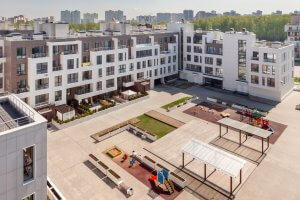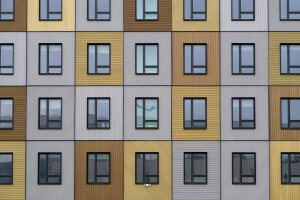- Commercial real estate
- Coronavirus
- Media, arts and culture
- Media arts and culture

Longer Reads
COVID-19 AND OUTSIDE SPACE: CONSIDERATIONS FOR LEISURE AND HOSPITALITY OPERATORS
With the easing of lockdown, we are seeing proposals across the UK to create pedestrian-only zones. They aim to not only alter how people travel safely but also make space for outdoor dining and drinking. The Government, through its Business and Planning Bill 2019-21, looks to make the latter easier. Here we explain some key considerations the leisure and hospitality operators need to keep in mind when using outside space.
3 minute read
Published 15 July 2020
Key information
- Specialisms
- Real Estate
- Services
- Commercial real estate
- Coronavirus
- Media, arts and culture
- Sectors
- Media arts and culture
Campaigns, like Soho Estates’ “summer festival” initiative, are pushing the government to temporarily ease regulations so leisure and hospitality operators can utilise public squares and other open spaces near their venues to serve customers, with deliveries and rubbish collections being limited to particular times of the day. Such alfresco dining could expand the number of potential customers while maintaining social distancing and therefore help businesses survive. Private landlords are also considering making more outside space available.
Private Land: Rights under a Lease, Licence or Easement
If a pub, café or restaurant is looking to place chairs and tables on privately owned land outside its demised premises for its customers, it should have a right to do so first in order to avoid trespassing. To begin with, the lease documentation should be checked – rights to place chairs and tables on the common parts may have already been granted in the lease. If the tenant is in the process of taking on a new lease, it may wish to request such a “sitting-out” right in the lease.
If there is no such right, it can be granted by way of a licence or an easement. A sitting-out licence may be preferred by the landlord because it affords increased control and flexibility. The landlord could terminate the licence easily when it requires and it may favour the personal nature of a licence, as it may not want to bind successors in title or allow such rights to pass on to any assignees of the tenant. On the other hand, a leasehold easement would provide the tenant (and any assignees) with higher levels of certainty, usually subsisting for the term of the lease. Furthermore, there is a good probability that those rights that are part of the lease terms, like in an easement, would be incorporated in a renewal lease of the main demise (under the Landlord and Tenant Act 1954) as a formal right, whilst rights outside the lease terms, such as those in a sitting-out licence, would not normally be included. However, depending on the lease’s rent review provisions (if any), any value connected to such rights in an easement could affect the rent and rent reviews, whereas a personal licence should have no impact.
In light of the current circumstances regarding Covid-19 and the risk of future mandatory measures by the government preventing usage of the space, the tenant would want to ensure any licence contains provisions whereby it can terminate the licence on such event or possibly suspend payment of its licence fee.
The tenant should also keep in mind that it may have contractual obligations in the lease, licence or otherwise to not cause nuisance, annoyance, disturbance or inconvenience to the landlord or other tenants or occupiers of the centre, estate or building or any neighbouring property. It may have additionally covenanted to not allow any noise, flashing lights or smells to escape so as to cause such nuisance or annoyance.
The landlord may have existing obligations to neighbouring premises to not obstruct particular areas, so the tenant may have to be flexible in the exact space it wishes to use for its chairs and tables.
Public Highway and Pedestrianisation Orders
To place chairs and tables on public highway outside a pub, café or restaurant, a licence from the local authority is needed. The form of such licence will depend on the relevant local authority, which is likely to have a standard form document.
Separately, a local planning authority could apply to enhance an area’s amenity through the elimination of vehicular rights on a highway, although a pedestrianisation order cannot be made on a trunk road, a principal road or a Greater London Authority road. There are different procedures for making a pedestrianisation order depending on whether it relates to an area outside or within Greater London. Briefly, orders outside Greater London are made by the Secretary of State and those within Greater London are made by the relevant London council (where the Mayor of London’s consent may be needed).
Other Considerations
Other points for operators to consider include thinking about whether the area is appropriately surfaced and suitable for its required usage and whether any works would be necessary.
As a reminder, the outside space should be operated in accordance with all relevant consents and laws. The correct planning permissions and any other consents should be obtained as necessary. The proper licences (and variations as needed) should be in place regarding any alcohol sale and consumption, and a dialogue with the local authority as early as possible is recommended. If the outside area is not covered by the premises licence, a variation will need to be obtained to include it if alcohol is to be sold outside. It would most likely be considered a major variation to the licence, which requires the application to be advertised. The application process will take about a month if it is unopposed and longer if there are objections. However, if the premises licence permits the sale of alcohol for consumption off the premises, then alcohol could be consumed in the outside area.
Encouragingly for leisure and hospitality operators, ministers were said to be contemplating giving blanket permission for bars, cafés, restaurants and pubs to use pedestrianised streets for outdoor dining, and, at the time of writing, the Business and Planning Bill 2019-21 intends to introduce a “streamlined and cheaper” way for such businesses to secure pavement licences from local authorities in England (allowing furniture on particular highways), until the end of September 2021. The application fee would be capped at £100 and the consultation period would fall from the current 28 calendar day minimum to 5 working days. With no local authority decision, the licence would be deemed to have been granted for a year. Otherwise, the licence duration would be at the local authority’s discretion (with a minimum of 3 months), although licences are expected to be granted for at least 12 months, with no licence lasting beyond 30 September 2021. The licence-holder would also benefit from deemed planning permission to use the land for anything carried out pursuant to the licence. Moreover, if a business possesses a licence to serve alcohol on its premises, proposed temporary amendments to the Licensing Act 2003 would permit the sale of alcohol for consumption off the premises without a variation. It is hoped that these temporary measures, if passed, will enable businesses to take advantage of the summer period.
Whilst increasing the use of outside space by operators can help to meet the challenges Covid-19 has inflicted on businesses, it can also facilitate the management of broader issues related to environmental concerns like toxic air, thus garnering support from a number of quarters. Many see this as an opportunity to promote longer-term, sustainable practices and, as Sadiq Khan, the Mayor of London, said, “to make sure we don’t replace one public health crisis with another”.
First published in Estates Gazette.
Related content
Longer Reads
COVID-19 AND OUTSIDE SPACE: CONSIDERATIONS FOR LEISURE AND HOSPITALITY OPERATORS
With the easing of lockdown, we are seeing proposals across the UK to create pedestrian-only zones. They aim to not only alter how people travel safely but also make space for outdoor dining and drinking. The Government, through its Business and Planning Bill 2019-21, looks to make the latter easier. Here we explain some key considerations the leisure and hospitality operators need to keep in mind when using outside space.
Published 15 July 2020
Associated sectors / services
Campaigns, like Soho Estates’ “summer festival” initiative, are pushing the government to temporarily ease regulations so leisure and hospitality operators can utilise public squares and other open spaces near their venues to serve customers, with deliveries and rubbish collections being limited to particular times of the day. Such alfresco dining could expand the number of potential customers while maintaining social distancing and therefore help businesses survive. Private landlords are also considering making more outside space available.
Private Land: Rights under a Lease, Licence or Easement
If a pub, café or restaurant is looking to place chairs and tables on privately owned land outside its demised premises for its customers, it should have a right to do so first in order to avoid trespassing. To begin with, the lease documentation should be checked – rights to place chairs and tables on the common parts may have already been granted in the lease. If the tenant is in the process of taking on a new lease, it may wish to request such a “sitting-out” right in the lease.
If there is no such right, it can be granted by way of a licence or an easement. A sitting-out licence may be preferred by the landlord because it affords increased control and flexibility. The landlord could terminate the licence easily when it requires and it may favour the personal nature of a licence, as it may not want to bind successors in title or allow such rights to pass on to any assignees of the tenant. On the other hand, a leasehold easement would provide the tenant (and any assignees) with higher levels of certainty, usually subsisting for the term of the lease. Furthermore, there is a good probability that those rights that are part of the lease terms, like in an easement, would be incorporated in a renewal lease of the main demise (under the Landlord and Tenant Act 1954) as a formal right, whilst rights outside the lease terms, such as those in a sitting-out licence, would not normally be included. However, depending on the lease’s rent review provisions (if any), any value connected to such rights in an easement could affect the rent and rent reviews, whereas a personal licence should have no impact.
In light of the current circumstances regarding Covid-19 and the risk of future mandatory measures by the government preventing usage of the space, the tenant would want to ensure any licence contains provisions whereby it can terminate the licence on such event or possibly suspend payment of its licence fee.
The tenant should also keep in mind that it may have contractual obligations in the lease, licence or otherwise to not cause nuisance, annoyance, disturbance or inconvenience to the landlord or other tenants or occupiers of the centre, estate or building or any neighbouring property. It may have additionally covenanted to not allow any noise, flashing lights or smells to escape so as to cause such nuisance or annoyance.
The landlord may have existing obligations to neighbouring premises to not obstruct particular areas, so the tenant may have to be flexible in the exact space it wishes to use for its chairs and tables.
Public Highway and Pedestrianisation Orders
To place chairs and tables on public highway outside a pub, café or restaurant, a licence from the local authority is needed. The form of such licence will depend on the relevant local authority, which is likely to have a standard form document.
Separately, a local planning authority could apply to enhance an area’s amenity through the elimination of vehicular rights on a highway, although a pedestrianisation order cannot be made on a trunk road, a principal road or a Greater London Authority road. There are different procedures for making a pedestrianisation order depending on whether it relates to an area outside or within Greater London. Briefly, orders outside Greater London are made by the Secretary of State and those within Greater London are made by the relevant London council (where the Mayor of London’s consent may be needed).
Other Considerations
Other points for operators to consider include thinking about whether the area is appropriately surfaced and suitable for its required usage and whether any works would be necessary.
As a reminder, the outside space should be operated in accordance with all relevant consents and laws. The correct planning permissions and any other consents should be obtained as necessary. The proper licences (and variations as needed) should be in place regarding any alcohol sale and consumption, and a dialogue with the local authority as early as possible is recommended. If the outside area is not covered by the premises licence, a variation will need to be obtained to include it if alcohol is to be sold outside. It would most likely be considered a major variation to the licence, which requires the application to be advertised. The application process will take about a month if it is unopposed and longer if there are objections. However, if the premises licence permits the sale of alcohol for consumption off the premises, then alcohol could be consumed in the outside area.
Encouragingly for leisure and hospitality operators, ministers were said to be contemplating giving blanket permission for bars, cafés, restaurants and pubs to use pedestrianised streets for outdoor dining, and, at the time of writing, the Business and Planning Bill 2019-21 intends to introduce a “streamlined and cheaper” way for such businesses to secure pavement licences from local authorities in England (allowing furniture on particular highways), until the end of September 2021. The application fee would be capped at £100 and the consultation period would fall from the current 28 calendar day minimum to 5 working days. With no local authority decision, the licence would be deemed to have been granted for a year. Otherwise, the licence duration would be at the local authority’s discretion (with a minimum of 3 months), although licences are expected to be granted for at least 12 months, with no licence lasting beyond 30 September 2021. The licence-holder would also benefit from deemed planning permission to use the land for anything carried out pursuant to the licence. Moreover, if a business possesses a licence to serve alcohol on its premises, proposed temporary amendments to the Licensing Act 2003 would permit the sale of alcohol for consumption off the premises without a variation. It is hoped that these temporary measures, if passed, will enable businesses to take advantage of the summer period.
Whilst increasing the use of outside space by operators can help to meet the challenges Covid-19 has inflicted on businesses, it can also facilitate the management of broader issues related to environmental concerns like toxic air, thus garnering support from a number of quarters. Many see this as an opportunity to promote longer-term, sustainable practices and, as Sadiq Khan, the Mayor of London, said, “to make sure we don’t replace one public health crisis with another”.
First published in Estates Gazette.
Associated sectors / services
- Commercial real estate
- Coronavirus
- Media, arts and culture
- Media arts and culture
Need some more information? Make an enquiry below.
Enjoy reading our articles? why not subscribe to notifications so you’ll never miss one?
Subscribe to our articlesMessage us on WhatsApp (calling not available)
Please note that Collyer Bristow provides this service during office hours for general information and enquiries only and that no legal or other professional advice will be provided over the WhatsApp platform. Please also note that if you choose to use this platform your personal data is likely to be processed outside the UK and EEA, including in the US. Appropriate legal or other professional opinion should be taken before taking or omitting to take any action in respect of any specific problem. Collyer Bristow LLP accepts no liability for any loss or damage which may arise from reliance on information provided. All information will be deleted immediately upon completion of a conversation.
Close




















































